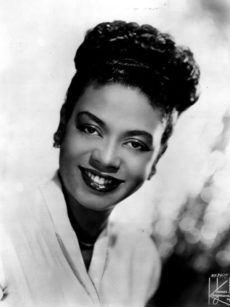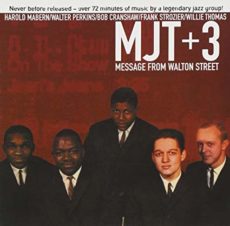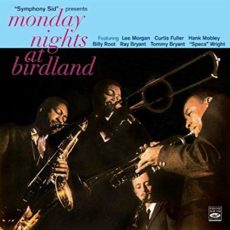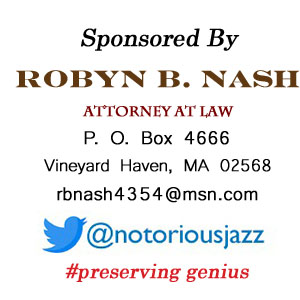
Three Wishes
The Baronnes inquired of Hazel Scott if she had three wishes what would they be, and she responded:
- “For more people to really be unafraid of the truth~beginning with myself.”
- “For real freedom from fear of reprisals because of the fact that I am as God made me: different.”
- “For more love and patience: between us all and for us all.”
*Excerpt from Three Wishes: An Intimate Look at Jazz Greats ~ Compiled and Photographed by Pannonica de Koenigswarter
More Posts: baroness,history,instrumental,jazz,music,pannonica,piano,three,vocal,wishes

Daily Dose Of Jazz…
Brian Lemon was born on February 11, 1937 in Nottingham, England to parents who were semi-professional dance-band violinists who both worked for the cigarette manufacturer John Player & Sons. Inspired by Fats Waller and later by Art Tatum and Teddy Wilson, he studied the piano with Reg Conroy, a local teacher, and was soon proficient enough to perform in palais bands in his home city.
By the mid-1950s, at 19, he moved to London and joined Freddy Randall’s group. After that, he worked with George Chisholm and Kenny Baker. Over the years, Brian worked with Benny Goodman, Charlie Watts, Scott Hamilton, Buddy Tate, Milt Jackson, Ben Webster, and Digby Fairweather. He led an octet that played songs by Billy Strayhorn.
For 10 years from 1994 Lemon recorded a sequence of 27 albums for Zephyr, with seven as leader. Zephyr was set up by retired businessman John Bune to record Lemon’s work. Adelaide Hall recorded an album with The Brian Lemon Half-Dozen. A rare copy is at the British Library.
After the development of severe osteoarthritis in his handsLemon retired from music around 2005. Pianist and arranger Brian Lemon passed away on October 11, 2014.
More Posts: bandleader,history,instrumental,jazz,music,piano

Daily Dose Of Jazz…
Walter “Baby Sweets” Perkins was born on February 10, 1932 in Chicago, Illinois. Starting out in his hometown, he began his professional career drumming with Ahmad Jamal in 1956–57. He recorded as a leader for Argo Records in 1957 under the name MJT+3 with trumpeter Paul Serrano, Nicky Hill on tenor saxophone, Muhal Richard Abrams on piano, and bassist Bob Cranshaw.
1959 witnessed the regrouping under the same name with Willie Thomas on trumpet, Frank Strozier on alto saxophone, pianist Harold Mabern, and Cranshaw on bass. They recorded four albums for Vee-Jay in 1959 and 1960 and played in Chicago until 1962 when Walter made his move to New York City.
Perkins played with Sonny Rollins in 1962 and accompanied Carmen McRae in 1962–63. By 1964 he was playing with Art Farmer and Teddy Wilson, however, following this he recorded with Rahsaan Roland Kirk, George Shearing, Gene Ammons, Charles Mingus, Billy Taylor, Etta James, J.J. Johnson, Johnny Coles, Booker Ervin, Jaki Byard, Lucky Thompson, Pat Martino, Sonny Stitt, Sonny Criss, Ray Bryant, Duke Pearson, Bobby Timmons, and Charles Earland. And that’s the shortlist as he recorded some 44 albums throughout his career as a sideman.
Drummer Walter Perkins passed away on February 14, 2004 in Queens, New York.
More Posts: bandleader,history,instrumental,jazz,music,vocal

Requisites
Monday Night at Birdland is a live album that was recorded on April 21, 1958 at Birdland in New York City and released by the Roulette label.
Track Listing | 46:00
- Introduction by Symphony Sid – 0:09
- Walkin’ (Richard Carpenter) – 12:26
- All the Things You Are (Jerome Kern, Oscar Hammerstein II) – 11:27
- Bag’s Groove (Milt Jackson) – 12:29
- There Will Never Be Another You (Harry Warren, Mack Gordon) – 9:29
- Hank Mobley, Billy Root – tenor saxophone
- Lee Morgan – trumpet
- Curtis Fuller – trombone
- Ray Bryant – piano
- Tommy Bryant – bass
- Specs Wright – drums
Monday Night at Birdland | by Eddie Carter
This morning’s subject of discussion takes us to the legendary jazz club Birdland where Monday nights were always special, especially during the fifties and sixties. Musicians and vocalists who were performing would be off that night and the stage would be given to up and coming jazz artists. Thankfully, Roulette Records was available to record the performance on April 21st to give jazz fans, Monday Night at Birdland (Roulette R–52015/SR–52015) to enjoy for all who couldn’t be there in person. The Master of Ceremonies for these weekly jam sessions is the legendary jazz disc jockey, “Symphony Syd” Torin of WBNX in the Bronx, New York; WHOM in Jersey City, New Jersey, and WWRL, WMCA and WJZ in New York City. Syd announces all the tunes on the album and has a brief comment after three of them conclude. The stars of this set are Lee Morgan on trumpet; Curtis Fuller on trombone; Hank Mobley, Billy Root on tenor sax; Ray Bryant on piano; Tommy Bryant on bass and “Specs” Wright on drums. My copy used in this report is the 1988 Spanish Mono reissue (FSR-631) by Fresh Sound Records.
Symphony Syd starts the first side with the song’s introduction; the septet then launches Walkin’ by Richard Carpenter. The trio opens the song evolving into the ensemble’s collective melody. Hank takes the spotlight first wailing enthusiastically followed by Lee who picks up the pace with a bright tone and feisty phrasing. Curtis takes the reins next with a considerable zest for a rousing performance, Ray solos with evident delight in the next reading. “Specs” takes the final scintillating statement in exchange with the front line for a robust finish into the closing chorus and climax. The septet eases the throttle back for the 1939 standard, All The Things You Are by Jerome Kern and Oscar Hammerstein II. Fuller cooks at an easy groove on the opening melody, then infuses the lead solo with a lively simplicity and splendor. Mobley makes his presence felt on a brisk interpretation next, then Morgan illustrates his assured mastery on the trumpet with an engaging performance. Root takes his first solo next, giving an exquisite statement that fits the ensemble’s artistic temperament with a superb reading. Bryant ends with a short solo that’s profoundly moving before the collective reprise and coda.
Side Two opens with Milt Jackson’s contemporary classic, Bags’ Groove; it was written in 1952 and made its debut on Wizard of The Vibes (Blue Note LP 5011), released that year. After a collective theme treatment, Lee is up first, combining lyricism and emotion for a charming lead solo. Curtis soars joyously on the next statement, then comes Hank who takes the next reading with a solid rock-steady rhythm from beginning to end. Billy steps up next for a captivating performance unleashing red-hot notes from his horn and Ray glows brilliantly on the final spot ahead of the out-chorus and ovation. The set ends with an invigorating finale, There Will Never Be Another You by Harry Warren and Mack Gordon, originally written in 1942 and appearing in the musical film, Iceland. The propulsive power of Wright’s drums brings the song to life leading to the speedy melody. Mobley accelerates to race car speed on the opening statement and never decelerates. Root’s tenor sax is an adrenaline rush on the next scintillating solo, followed by Morgan who also gives a spectacular exhibition. Fuller pulls no punches with a buoyant, effervescent interpretation next and Bryant shows he’s a fierce and fervid performer on the closer before the closing chorus and appreciative applause from the crowd.
Monday Night at Birdland was produced by Rudy Traylor, who’s also an arranger, jazz drummer, pianist, and vibraphonist. The sound quality of the album is quite good throughout, and Hank Mobley, Billy Root, Lee Morgan, Curtis Fuller, Ray Bryant, Tommy Bryant, and “Specs” Wright offer the listener the very essence of live jazz. In fact, there’s only one noticeable defect, on Symphony Syd’s introduction of Walkin’, his microphone has a little harshness. I don’t know if this appears on the original album or is exclusive to this LP. I’ll admit, I’m not that familiar with Fresh Sound Records, and don’t know if they’re in that group of European labels like DOL, Doxy, Jazz Wax, Jazz Workshop, Wax Time, etc. However, I’m pretty impressed with what I’ve heard on this particular reissue and the performances are worth the price of admission for me to invite you to seek a copy of Monday Night at Birdland to check out for yourselves and form your own opinion!
~ All The Things You Are, There Will Never Be Another You – Source: JazzStandards.com ~ Bags’ Groove – Source: Wikipedia.org ~ © 2020 by Edward Thomas Carter
More Posts: choice,classic,collectible,collector,history,instrumental,jazz,music,saxophone

Daily Dose Of Jazz…
Erskine Butterfield, born February 9, 1913 in Syracuse, New York and began playing piano at an early age when his family moved to Newark, New Jersey, where he later studied piano. In the 1930s, he regularly appeared on radio, including WOR in New York City, and played with Noble Sissle’s orchestra. He made his first sound recording and reproduction in 1937 on the Variety record label.
In 1938, he signed with Decca Records for which he recorded over forty titles between 1940 and 1942, many of which were released. Butterfield was called the Singing Vagabond of the Keys by the Chicago Defender in 1939. He was innovative in utilizing black and white musicians together in his combo, which included session musicians such as clarinetist Jimmy Lytell, guitarist Carmen Mastren, and Haig Stevens on bass.
1939 saw Butterfield signing with Joe Davis of Beacon Records, with whom he would maintain a long term relationship. However, in 1943 he was drafted but continued to play in a group, recorded eight titles for Joe Davis under the name Erskine Butterfield and his Blue Boys in ‘44 and cutting V-Discs in 1945.
After World War II, Erskine formed a trio and toured extensively, but his music style was less successful commercially. He recorded for a number of small labels in the late 1940s, after which his recording activity dropped off. In 1956, however, he again recorded a number of titles for Joe Davis with a reformed group, Butterfield and his Blue Boys, including musicians such as Sam “The Man” Taylor on saxophone and Panama Francis on drums. He made appearances on The Nat King Cole Show, The Tony Martin Program and The Jo Stafford Show.
His light swing and traditional piano phrases resulted in some of his songs, such as Lovin’ Man and Because Of You, being used in film soundtracks. Pianist, singer, bandleader and composer Eskine Butterfield, credited with helping to invent the style of cocktail piano, passed away on July 11, 1961 in New York City.
More Posts: bandleader,history,instrumental,jazz,music,piano




